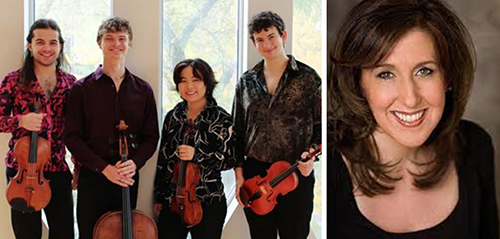by Kevin McLaughlin

Featured performers were mezzo-soprano Nancy Maultsby, faculty at Baldwin Wallace, and the Poiesis Quartet (Sarah Ma and Max Ball, violins, Jasper de Boor, viola, and Drew Dansby, cello), who formed at Oberlin Conservatory and were Grand Prize winners of the 2023 Fischoff National Chamber Music Competition. The concert kicked off the Rocky River Chamber Music Society’s season.
Brahms’ String Quartet Op. 51, No. 1, completed in 1873, came after twenty tries over a period of several years by the Beethoven-haunted composer. As he did with his First Symphony, Brahms settled on Beethoven’s “serious key” of C minor. The Poiesis gave a darkly energetic account of the work. Fast tempos and excitement marked the first two movements, a relaxed lyricism the intermezzo, and a churning nervousness the finale.
The Quartet produced an extraordinary, honeyed group sound. It may have been the acoustics of the hall or perhaps this configuration for this work (Ball on first, Ma on second) but the group seemed to eschew spotlights — individual lines rising from the texture — in favor of a consistently melded blend. The final coda was thrilling.
The closing lines of Richard Stout’s song cycle Songs of Correspondence are from a letter Willa Cather wrote to her brother Roscoe, late in life:
“Roscoe, my dear Roscoe / Do you remember a long time ago you wrote me such a dear letter? / You said, “we must take each other as we are?”/ That doesn’t sound very profound, but it is profound. / If more families lived up to it, there would be a good deal more peace in the world. / Take each other as we are. Do you remember?”
Coupling Cather’s words with a collective American musical language (Copland, Thomson, Ives), Stout — who is best-known as a member of the Cleveland Orchestra trombone section — has drawn not just an affectionate portrait of a beloved writer, but also of a gentler time in the United States.
Culled from letters that survive (Cather destroyed the majority and explicitly forbade publication while she was alive), the observations range from funny to snarky, wistful, and world-weary. The selection of text was aided by Stout’s mother, Cather scholar Janis Stout, who along with Andrew Jewell co-edited The Selected Letters of Willa Cather (2013). The woman, friend, and sibling who is enlivened by this music and text makes you want to have known her firsthand, or to at least reread the correspondence (which you can do now, thankfully, here).
In voice and persona, mezzo-soprano Nancy Maultsby embodied Cather as we’ve seen her in photographs and in our mind’s eye. Maultsby’s voice was both soft and steely when it needed to be. Her unenviable task was to produce clarity in the sometimes-crowded lines of text, while keeping the integrity of the musical line. The Poiesis Quartet, now reconfigured with Ma on first violin and Ball on second, were agile collaborators, pivoting from old-timey charm to moments of genuine tenderness.
Stout’s music is replete with “inside” devices — meters like 7/8 and 11/8 to match children’s ages (“My Namesake”) — as well as outwardly descriptive ones. In “Elsie,” he has de Boor finger-drum rhythms of a Mexican dance on the back of their viola to accompany the other three strings. And later, in the same movement, quarter tones serve as sly mimesis of “tin cans,” and the violinists speak out the sound “tchlot” on an awkward part of the beat to simulate a flapping shoe sole during the alliterative line, “tin cans and old shoes, and a tang on the tongue.”
Friendships and her Great Plains home were lifelong sources of comfort to Cather. You can hear this appreciation in “Mariel” (addressed to Cather’s college pal): “You stood by me in the day when my friends were not many and when I owed much more to your friendship than I knew … I’d rather make you and Roscoe proud of me than anything else in the world.” The sincerity of the line brings a lump to your throat, and Stout’s lovely setting with Maultsby’s delivery intensified the sadness.
Cather’s words are exquisite, of course, but Stout’s music makes them resonate.
Published on ClevelandClassical.com October 3, 2023.
Click here for a printable copy of this article


